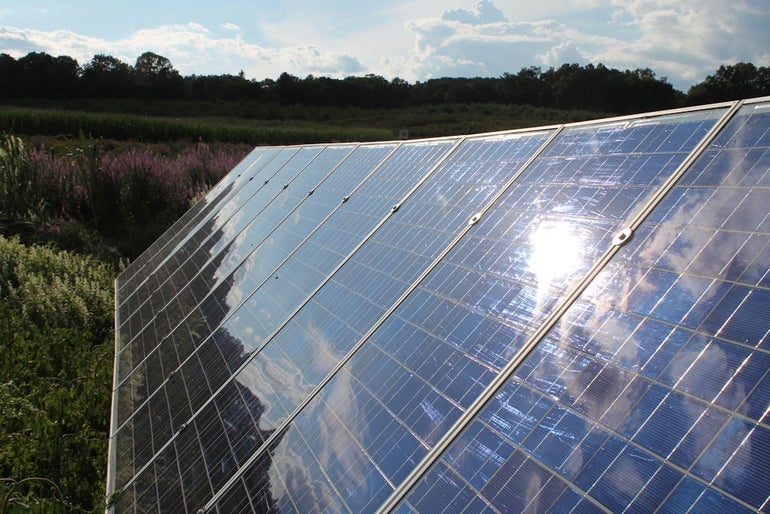The last decade of advancements in clean energy technology and its adoption here and around the country has proved that 100 percent renewable energy is a realistic goal for Massachusetts, activists said Wednesday, if the will is there among the state’s political leaders and if resistance to some clean energy projects can be overcome.
Environment Massachusetts released its annual report Wednesday examining Massachusetts’ progress in wind energy, solar power, electricity energy efficiency programs, electric cars and energy storage over a 10-year period and comparing the growth to the rest of the states. As of 2020, America was producing nearly four times as much renewable energy from the wind and sun (11 percent) as it was in 2011 (3 percent).
And if wind, solar and geothermal generation maintain the growth rates they showed over the last decade, those three sources alone could meet the nation’s electricity demand by 2035, the organization said in its report.
“The last decade has proven that clean energy can power American homes, businesses and industry. And it’s put America on the cusp of a dramatic shift away from polluting energy sources,” Hanna Nuttall, clean energy associate at Environment Massachusetts, said. “With renewable energy prices falling and new energy saving technologies being developed every day, Massachusetts can and should set its sights on sourcing 100 percent of our energy from clean, renewable sources.”
Environment Massachusetts supports legislation (H 3288/S 2136) that would require utilities to provide 100 percent clean electricity by 2035 and would transition Massachusetts to 100 percent clean heating and transportation by 2045.
The bill, which Environment Massachusetts said has the support of 88 legislative co-sponsors and more than 60 environmental and civic groups, is awaiting a hearing before the Joint Committee on Telecommunications, Utilities and Energy. Supporters said Wednesday that the new Environment Massachusetts report “affirms that our vision of 100 percent clean energy in Massachusetts is not a pipe dream.”
“The question no longer is ‘is 100 percent clean energy possible?’,” Jess Nahigian, political and legislative director for the Massachusetts Sierra Club, said during a press conference held to discuss the report. “Instead, the question is can we marshal the political power to meet the urgency of the climate crisis?”
The referendum earlier this month in Maine that dealt a significant blow to the transmission project that is intended to bring clean hydropower from Quebec to Massachusetts showed, though, that political will is not necessarily enough to make the switch to clean energy a reality.
Despite support from the current Democratic governor of Maine, Republican Massachusetts Gov. Charlie Baker, the former Republican governor of Maine and the Democratic Biden White House, Maine voters made clear that they do not want the New England Clean Energy Connect project to advance as planned, potentially undermining the region’s clean energy goals.
Nuttall said Wednesday that she does not think the result of the Maine referendum was “Mainers saying that they don’t want renewable energy.”
“I think that the concerns in the opposition were more to do with the siting and the fact that the project would be running through Maine but delivering energy essentially to Massachusetts,” she said. “And so I don’t think that that was voters saying that they’re not ready for renewable energy. But I also think that with this project maybe falling apart, we have an opportunity still here in Massachusetts to produce renewable electricity within the state.”
Another key part of the Baker administration’s climate and energy policy, the controversial regional effort to reduce vehicle emissions along the East Coast, took another hit this week when Connecticut Gov. Ned Lamont told reporters in the Nutmeg State that he doesn’t think he will be able to get lawmakers there to support the Transportation Climate Initiative in the near future.
TCI is a central part of Baker’s transportation and climate agenda and is “critical” to the efforts that will be needed to achieve his administration’s goal of net-zero emissions by 2050, Energy and Environmental Affairs Secretary Kathleen Theoharides said last year.
“Look, I couldn’t get that through when gas prices were at historic low,” Lamont said, according to CT Mirror. “So I think legislators are pretty clear, it’s going to be a tough rock to push when the gas prices are so high, so no.”
Lamont and legislative Democrats, working in June under the pressure of a deadline to finalize legislation and to finish a biennial state budget, scrapped the state’s implementation of TCI as part of a compromise but supporters were optimistic the idea could resurface.
“With Connecticut backing off from TCI, Massachusetts should follow. There is no legitimate reason for Massachusetts to continue in the scheme,” Paul Craney, spokesman for the Massachusetts Fiscal Alliance, said. “At this point, it’s no longer a regional approach and will achieve next to nothing for the environment. It will, however, inflict significant economic harm on the working poor and middle class.”
The TCI program’s target of a 26 percent reduction in carbon emissions by 2032 could add an estimated 5 to 9 cents to the price of a gallon of gas, according to officials involved in the effort.
A potential 2022 initiative petition filed by Republican Rep. David DeCoste of Norwell and backed by Republican candidate for governor Geoff Diehl seeks to undermine Massachusetts’ participation in the Transportation Climate Initiative.
Initiative petition campaigns need to submit at least 80,239 signatures to local election officials by Wednesday for certification if they wish to keep their proposals alive. Craney said Wednesday that the signature gathering on the TCI question was a “completely volunteer-driven effort” and did not have an estimate of the number of signatures being turned in this week to municipal clerks.

